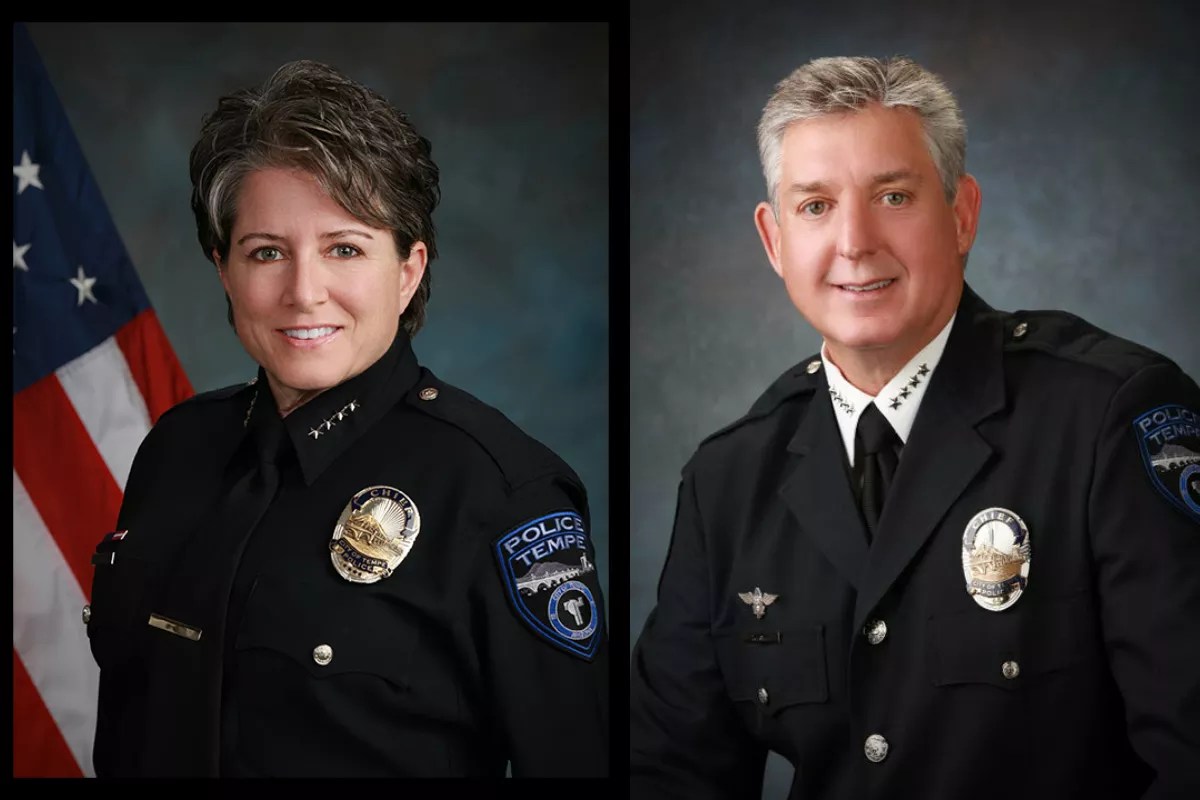
City of Tempe

Audio By Carbonatix
(UPDATE: The city flip-flopped yet again in August 2020, and paid Ryff the $150,000.)
The Tempe City Council has reversed course on a decision to settle a lawsuit brought by ex-Police Chief Tom Ryff.
At a City Council meeting following discussions during a closed-door executive session on Thursday, Tempe Mayor Mark Mitchell removed the settlement approval from the agenda.
Mitchell didn’t explain his decision at the meeting, and a spokesperson for the city of Tempe said only that the city will not be moving forward with the settlement and “looks forward to continuing to defend its position in court.”
But an email sent to Mitchell, City Council members, and the city manager on December 10 may offer some insight as to why the city changed its mind.
Tempe was set to pay Ryff $150,000 to settle a lawsuit Ryff filed in July 2017. Ryff, in his $1 million notice of claim, alleged the city breached a non-disparagement agreement in his retirement contract and prevented him from getting a job with the Tempe Union High School District when, in late 2016, current police chief Sylvia Moir received a phone call from Superintendent Kenneth Baca.
Baca wanted to hire Ryff for a $109,000-a-year job as the district’s executive director of student affairs and district safety. But Moir told Baca the department would be “uncomfortable” working with Ryff in that position, the lawsuit states. After talking with Moir, Baca rescinded the job offer to Ryff.
In response to Ryff’s lawsuit, the city said Ryff’s reputation was already damaged by past allegations of wrongdoing, including an old audio recording of Ryff encouraging a subordinate to lie so they could go out for the night. It is “publicly known that Ryff encouraged a subordinate officer to lie to his immediate superior officer,” the city stated in court filings.
The city specifically referenced the blog Operation Nation, run by Brian Wilkins, a frequent critic of Ryff and Tempe police. Wilkins, a former Tempe resident, has written extensively about Ryff and Tempe police after a 2008 run-in with Tempe police that left him in jail for 57 days on charges Wilkins says were bogus. Wilkins filed a lawsuit against the city over the arrest in 2009. The lawsuit was dismissed a year later in favor of the defendants.
After hearing about the proposed settlement, Wilkins emailed the mayor, City Council members, and City Manager Andrew Ching.
“I am writing to urge council members to reject this settlement offer and take the case to trial,” Wilkins wrote. “I understand the costs of prolonged litigation. But if you approve this settlement, you are essentially facilitating and approving official malfeasance and arguably criminal behavior by the former chief.”
Wilkins said that it would be unwise for the city to settle the case and said a U.S. District Court judge in Arizona denied a summary judgment in a similar case in which someone was accused of violating a non-disparagement agreement.
“Tempe city leaders have never held Ryff accountable for anything. Meanwhile, Tempe taxpayers have paid this man well over $4 million in his career,” Wilkins wrote. Ryff received a generous retirement package and was kept on as a consultant after he retired, during which time he received the same salary he did as police chief.
Phoenix New Times contacted Wilkins about the email, and Wilkins forwarded a response he said he received to the email from Tempe Vice Mayor Lauren Kuby. “Brian, thanks for writing to us,” Kuby wrote on December 11.
“The settlement is not a done deal; there needs to be a majority vote tomorrow. Can you tell me more about the disparagement argument? If the judge is allowing the jury to decide what is disparaging, that is a very subjective exercise, no?” Kuby continued. “The opinion you cited was referenced by the judge in our case, and they decided that it was a question of fact that the jury could decide.”
By deciding not to move ahead with the settlement, it appears the city is willing to risk letting a jury decide for themselves whether Moir’s remarks disparaged Ryff.
New Times asked the city to verify that the mayor and others had received the email, but a spokesperson for Tempe did not respond (despite responding to New Times’ follow-up request to clarify why the city hadn’t approved the settlement). Kuby confirmed the authenticity of the email shared with New Times by Wilkins.
The city did not admit any liability in the initial settlement agreement with Ryff, saying only that the “decision to settle was made to avoid significant expenses associated with protracted litigation.”
As part of the agreement, Ryff would have had to dismiss all claims against Tempe and its employees related to the alleged breach of his retirement contract’s non-disparagement provision. Ryff also would have been required to provide the City Attorney’s Office with all original copies of documents and evidence in his possession within a week after the Council approves the settlement.